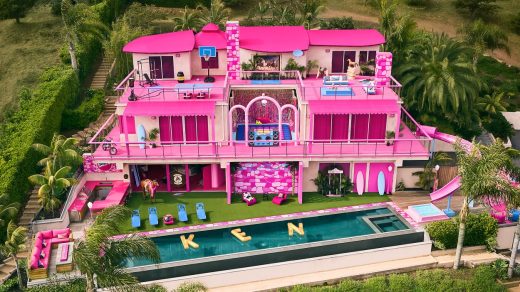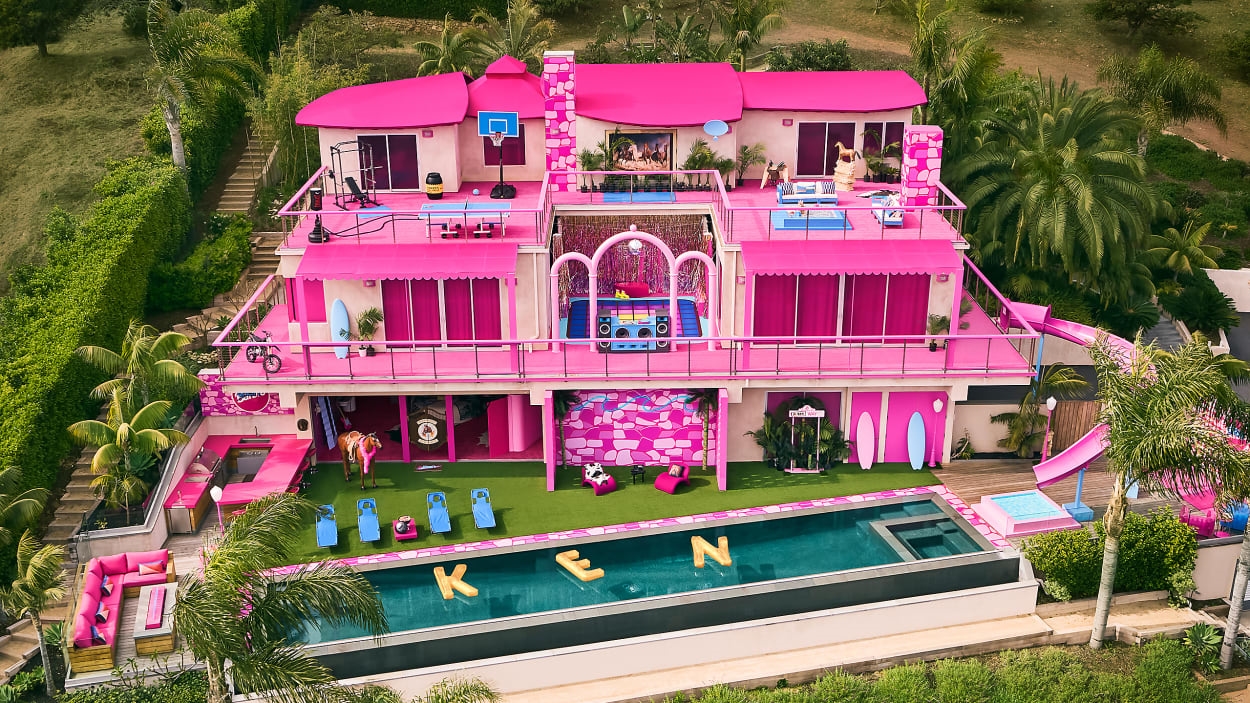Airbnb, Goop, Barbie, and the promise of the next great advertising platform
Airbnb’s newest host just listed a cozy little guest house off her main Montecito, California, home, and posted a video this week of a walk-through that includes a wine room, a Zen garden, access to a beautiful pool, and a stunning bathroom fully outfitted with a wide range of Goop products.
“Do you think this is a good place to put on Airbnb?” asks Oscar winner and Goop founder Gwenyth Paltrow.
The camera swings around to face Airbnb CEO Brian Chesky. “I’ve seen a lot of homes, and I think this is one of the best homes I’ve ever seen, for sure,” he replies.
In the listing itself, Paltrow—or, more likely, her marketing department—writes, “My Montecito home is my sanctuary for respite and mental clarity. I go there to recharge, to daydream about what we’re building at goop, and to reconnect with my family and treasured friends. Whether you’re seeking a place for unexpected connection or for well-deserved solitude and reflection, when you come to stay, I hope you’ll get as much joy out of the home as I do. Plus, I’ve loaded up your stay with some of my favorite goop essentials to nourish your body, mind, and soul.”
So . . . this isn’t just any Airbnb listing. It’s a Goop ad. If you book the place, you can tell your friends, over and over, “I’m at the combination Airbnb listing and Goop ad.”
The Paltrow vacation home is just the latest celebrity stunt-marketing listing on the platform, following Barbie’s Dreamhouse in June, and Seth Rogen’s Houseplant house in February. These high-profile homes for rent are not only becoming more frequent, but also a growing form of Airbnb marketing that positions it as a high-end, luxury good while being a ballast for the brand’s yearslong push into establishing its image to be as personal and human as possible.
During Airbnb’s earnings call with investors on Thursday, Chesky highlighted the partnership with Warner Bros. and Mattel as part of its overall “Only on Airbnb” campaign that aims to tap into global pop-culture moments. “The Barbie Malibu Dreamhouse has been a sensation, and it is now Airbnb’s most popular listing ever,” said Chesky. “We saw 13,000 press hits and more than 250 million social media impressions since it was announced. And to give you a sense of how much that is, that is twice—more than twice—as many impressions as were generated from our IPO.”
Chesky added that these types of “Only on Airbnb” campaigns are an effective way to introduce Airbnb and its unique inventory to new guests, and they’ll be an important part of the company’s playbook going forward.
Not that long ago, Airbnb was under attack. After more than a decade of disrupting travel and popularizing renting other people’s homes, the platform had a target put on its back by the competition, from traditional hotels to other short-term rental sites.
In 2021, Expedia’s Vrbo launched an ad campaign aimed at potential hosts that characterized Airbnb as the low-rent option for vacation rentals. “If you only list your vacation rental on Airbnb, you might get a few people,” the voiceover said. “But if you also list it on Vrbo, you’ll get Vrbo families who book bigger places like yours. Your dream guests await.”
Last year, it was Hilton firing the shots. The legacy hotel company dropped a spot called “Haunted,” that portrayed online short-term rentals as a gamble in terms of what you get versus the internet pictures, as well as the sometimes eclectic and regimented rules that some hosts insist upon (a common Airbnb complaint).
Meanwhile, since 2020 Airbnb’s own marketing strategy has eschewed performance-based digital and search advertising in favor of more brand-building work. That decision came after the company saw little impact on traffic to the platform after significantly cutting its spending during COVID-19.
So it decided to shift its marketing budget into brand and PR.
In February, in a call to investors, Chesky called PR Airbnb’s “most important” channel, saying that nearly 90% of the platform’s traffic remains direct. At the time, CFO Dave Stephenson told analysts that the shift in the company’s marketing spending had proven to be “incredibly effective.” That same month, Airbnb identified three strategic priorities for this year that included making hosting mainstream, perfecting its core service, and building the foundation for future products and services.
In May, shortly after Airbnb’s earnings report, the brand launched a new campaign around its “Rooms” offering, getting back to its basics and original roots of encouraging both hosts and travelers to consider renting rooms in occupied homes. The ad work was directly in line with what Chesky has called “education”-based advertising, aiming to show people the potential of this option by spotlighting specific hosts in Florence, Edinburgh, and Kyoto. The brand went all in on its connecting-humans vibe by sending people to stay in specific rooms and then using their reactions as the voiceover for the ads.
Nandi Welch, head of business strategy at New York-based consultancy Rupture Studio, says that this type of work is Airbnb hitting back, going on offense. “It just felt like they were sharpening their competitive teeth,” says Welch, “acknowledging that they do have real competitors now.”
The more recent push into celebrity- and brand-related work is Airbnb’s attempt to further entrench its brand and product in pop culture while simultaneously using the PR and earned media around these listings to reinforce people’s trust in the platform. No surprise, given Chesky’s excitement, that the company used a shot of the Barbie Dreamhouse to lead its most recent shareholder letter on its Q3 earnings report.
Beyond Barbie, the efforts over the past few years have ranged from DJ Khaled renting out his sneaker closet, Big Boi renting out his “Dungeon” family house, and Warner Bros. teaming with Airbnb to list the house from Scream and Carrie Bradshaw’s apartment from Sex and the City.
On Thursday, CFO Stephenson told analysts that the company’s marketing expenses as a percentage of revenue are expected to remain relatively flat year-over-year compared with 2022. “When we do things like the Barbie Dreamhouse and other big events like that, we’re able to kind of drive more awareness about Airbnb, about the uniqueness of our offerings,” he said. “And it’s just a powerful strategy for our marketing.”
Chesky then added that last year there were 600,000 articles written about the brand. “So, people talk a lot about Airbnb, and now I think what you’re also seeing is social media, whether it’s only on Barbie or just generally Airbnb social media, it’s just a topic of conversation,” he said. “That is just a testament to when you invest in a brand, when your brand’s a noun and a verb, and you have something unique, you get a lot of those benefits. And I think it’s going to be consistent, and we’ll have pretty consistent marketing spend as a percent of revenue over time because of the strength of the brand.”
Looking at its partnerships with Goop, Houseplant, Mattel, and Warner Bros., among others, Airbnb could potentially evolve this into its own unique approach to turning its platform into a media option for other brands. Walmart has built its Walmart Connect advertising platform into a $2.7 billion business, which in its February earnings reported 30% year-over-year growth. Uber expects to hit $1 billion in advertising revenue by 2024.
Rogen was just as excited about Airbnb as the platform has been to have him on board. “The idea that a giant company like Airbnb is excited about a partnership with a company like Houseplant is really exciting,” Rogen told me at the time.
Taco Bell opened a pop-up Palm Springs hotel in 2019. Cheetos has opened a pop-up New York restaurant in 2017, and a Brazilian mansion. Why shouldn’t Airbnb be the platform for these experiential events? Brand-collaboration culture is only becoming more entrenched: Witness last week’s French’s Mustard x Skittles moment. When done well, the value of PR-based earned media that these types of stunts can attract is only getting bigger. With 150 million worldwide users, Airbnb may just be an advertiser’s dream.
Gwyneth Paltrow already knows this. Her Airbnb pitch this week even had a built-in Goop tagline: “Your skin is going to be better when you leave than when you came.”
(22)



